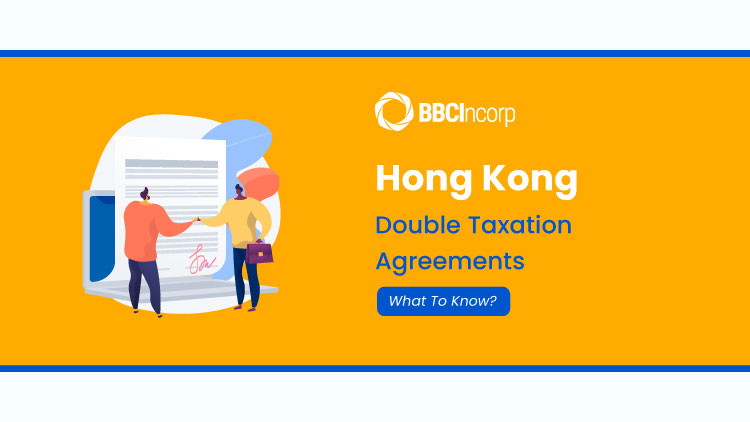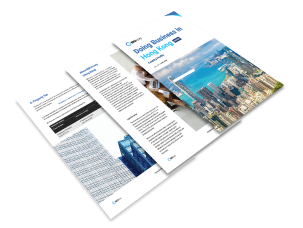
If you run a business abroad and anticipate avoiding taxes across borders, Hong Kong’s double taxation agreements would be one of your biggest concerns.
In addition to a high standard of living specifically designed for the city’s rapidly changing economy, Hong Kong also offers several tax benefits, including various taxation relief incentives. This makes the country an extremely popular destination for investors and entrepreneurs.
Let’s go through the essential components of the double taxation relief for Hong Kong businesses in today’s article.
An overview of Double Taxation in Hong Kong
Double taxation occurs when a taxpayer is taxed twice on the same profit/ income item by two or more jurisdictions. For example, if you are a US resident who owns a company in Hong Kong, you must pay taxes on income generated in Hong Kong as well as US taxes on dividends received from those earnings.
Because double taxation is considered a barrier to international trade, countries around the world usually enter into Double Taxation Agreements to reduce double taxation and protect the rights of citizens and investors.
As a foreign investor, you must understand the situation of the double taxation avoidance between Hong Kong and other countries, as well as the conditions and provisions that foreigners must follow to maximize profits.
For that reason, foreign investors should understand Hong Kong’s double tax avoidance situation as well as the restrictions and provisions they must follow to maximize profits.
Get more information on the Hong Kong Tax System by reading our dedicated article.
Hong Kong Double Taxation Agreements (DTAs)
What is a Double Tax Agreement in Hong Kong?
A Double Tax Agreement (DTA) in Hong Kong, also known as a Hong Kong double tax treaty is a bilateral (two-party) agreement made between Hong Kong and another jurisdiction to avoid double taxation of income and property.
DTAs can be used to reduce double taxation and fiscal evasion while also strengthening relationships between Hong Kong and other international tax administrations.
Please keep in mind that these double tax agreements only apply if you are a resident of Hong Kong or the other DTA jurisdiction.
What are the purposes of DTAs?
According to the Hong Kong Special Administrative Region Government (HKSARG), Double Taxation Agreements (DTAs) serve the following purposes:
- Provide taxpayers with certainty about the contracting parties’ taxing rights
- Aid taxpayers in understanding their potential tax liabilities in the other country
- Prevent double taxation caused by tax jurisdiction overlap
- Eliminate tax avoidance and evasion concerning various types of income flows between Hong Kong and DTA partners
- Determine the tax rules and jurisdictional authority that will govern transaction trade
- Provide additional incentives for overseas businesses to conduct business in Hong Kong and for Hong Kong companies to conduct business in other jurisdictions
Who can apply for DTAs?
A double tax treaty is only available to Hong Kong residents who are not concurrent residents of the contracting countries under the DTAs.
The term Hong Kong resident refers to the following:
- A person who ordinarily resides in Hong Kong i.e. has a permanent home in Hong Kong, or
- An individual who spends more than 180 days in Hong Kong during the assessment year.
For corporations, only Hong Kong-incorporated companies are eligible for relief.
A company is considered a Hong Kong-incorporated company if and only if the following conditions are met:
- It is either incorporated in Hong Kong or
- It is incorporated outside of the country but managed and controlled from Hong Kong
Categories of DTAs in Hong Kong
More than 40 jurisdictions have signed Comprehensive Double Taxation Agreements (DTAs) with Hong Kong. Here is the full list of DTAs for your reference.
Hong Kong’s double tax treaties are classified into five types:
- Comprehensive DTAs
- Airline and shipping income DTAs
- Aircraft operation income DTAs
- Shipping income DTAs
- Exchange of information agreements
Aside from Comprehensive DTAs, Hong Kong has actively engaged trading partners in the negotiation of DTAs that include various types of income.
Notably, airline and shipping income are two areas of concern that deserve priority in addressing double taxation, given the country’s openness to the issue and the long wait for a comprehensive DTA to be signed. Both are categorized as Limited Double Taxation Agreements.
Aircraft operations are international in nature, and as a result, its people – airline operators – are more likely to be influenced by double taxation than other taxpayers. To reduce vulnerability in such cases, Hong Kong has offered a policy on double taxation relief arrangements for airline income in bilateral Air Services Agreements with aviation partners.
Another type of income that may pique your interest is shipping income. Hong Kong has amended the reciprocal tax exemption for shipping income since 1 April 1998 to benefit ship operators.
Accordingly, ship operators are not subject to taxes imposed by jurisdictions with reciprocal tax exemption legislation. Hong Kong has also begun negotiations for a double taxation agreement with other legislation where reciprocal tax exemption is not available.
Free ebook
Everything you need to start business in Hong Kong
Find out in a matter of minutes.

Methods for Double Taxation Relief in Hong Kong
The following are four popular methods for avoiding double taxation:
Tax exemption
Foreign-sourced income may be subject to Hong Kong tax exemption, but whether it is applied to the full amount or just a portion of it depends on the circumstances.
If you enter into a contract with a supplier or customer outside of Hong Kong and conduct business outside of the country, the profits you make are not taxable.
Foreign tax credit
The tax paid in the jurisdiction where the income is generated is deducted from the tax payable in the jurisdiction where the income is received.
In simpler terms, if you earned money outside Hong Kong and paid taxes on that income in the country where you worked, Hong Kong would deduct you from paying taxes again on the same income.
It should be noted that to claim income exemption (from 2018/19 onwards):
- Individuals must have paid taxes on that income in a country that does not have a tax agreement (CDTA) with Hong Kong.
- The income in question should be related to services they provided in that foreign country.
Tax deduction
Hong Kong allows domestic tax to be applied to foreign income after a foreign tax deduction on a turnover basis.
Reduced tax rate
This allows income to be taxed at a lower rate and is commonly applied to interest, dividends, and royalties. A summary of the tax rate caps applicable to Hong Kong residents for payments of interest, dividends, royalties, and technical service fees can be found HERE.
Note
If your profits are derived from sources outside of Hong Kong, you could be eligible for an offshore tax claim – exemption of profits tax.
Our Hong Kong Offshore Claim Tool helps you determine the tax status of your income types and ascertain your eligibility for making an offshore claim.
Conclusion
Hong Kong should be taken into account when deciding on the best location for business operations due to its Double Taxation Agreements.
Should you have any questions about starting a business in Hong Kong, do not hesitate to contact us by dropping a chat message or emailing us via service@bbcincorp.com. We are happy to help.
Disclaimer: While BBCIncorp strives to make the information on this website as timely and accurate as possible, the information itself is for reference purposes only. You should not substitute the information provided in this article for competent legal advice. Feel free to contact BBCIncorp’s customer services for advice on your specific cases.
Industry News & Insights
Get helpful tips and info from our newsletter!
Stay in the know and be empowered with our strategic how-tos, resources, and guidelines.


